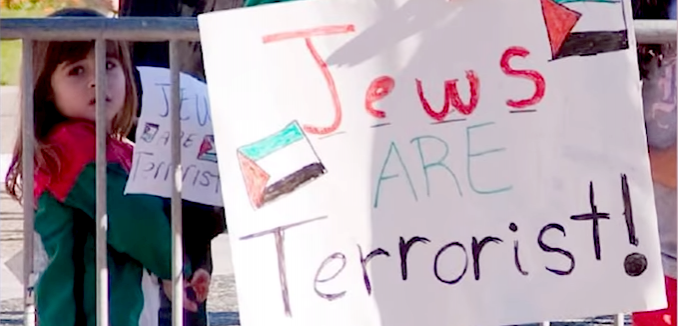A committee of the University of California’s Board of Regents unanimously approved a proposal on Wednesday condemning anti-Semitism and “anti-Semitic forms of anti-Zionism,” saying that they were discrimination that must be challenged by campus leaders.
The ad hoc committee will be sending the “Statement of Principles Against Intolerance” to the full UC board for review on Thursday.
The vote came after debate over the language of the declaration, which initially denounced anti-Zionism in its entirety as a form of discrimination. Critics of the statement’s initial wording argued that prohibiting speech about Israel’s right to exist would infringe academic debate and First Amendment rights.
UCLA Professor Eugene Volokh argued in The Washington Post last week that although “a good deal of anti-Zionism is indeed anti-Semitic,” denouncing anti-Zionism writ large was a mistake, as “this debate must remain free, regardless of what the regents or I think is the right position.”
UC Regent Norman Pattiz said the amended language will help clarify that the university does not condemn legitimate criticism of Israel, only that which crosses the line into demonization of Jews.
The principles, which will apply to the entire UC system if adopted on Thursday, were drafted in response to concerns that Jewish students weren’t being adequately protected from anti-Semitic attacks on campus, particularly by anti-Zionist groups.
A petition released on Tuesday by the AMCHA Initiative, a campus watchdog group, and signed by over 4,000 UC stakeholders—including students, alumni, donors, faculty, staff, and parents—commended the Regents for “recognizing the reality faced by Jewish students at UC.”
“President Obama, Pope Francis, British Prime Minister Cameron, French Prime Minister Valls, the majority of presidential candidates and the world’s leading anti-Semitism scholars all recognize anti-Zionism as anti-Semitism,” the petition continued.
Tammi Rossman Benjamin, director of AMCHA, applauded the committee for the vote on Wednesday. “What an important day for Jewish students in California, nationally and internationally,” Rossman Benjamin said in a statment. “There is absolutely no doubt that anti-Zionism is the driving force behind the alarming rise in anti-Semitism at UC and at schools across the country. Far too often, anti-Israel activists single out, harass, intimidate and even assault Jewish students, regardless of how that student feels about Israel. Far too often, what starts as acceptable, welcomed and appropriate criticism and debate on Israel becomes anti-Zionist discrimination and hate. We applaud the Regents for their leadership and courage today.”
A study published by AMCHA earlier this month found a strong correlation between anti-Zionist activity, including anti-Israel boycott campaigns, and the occurrence of anti-Semitic incidents on American college campuses. In its investigation of anti-Semitism on over 100 American universities, the report found that “A majority of incidents that threatened the safety or well-being of Jewish students or violated their civil rights were linked to Israel or Zionism.”
Four campuses in the University of California system were in the top five of AMCHA’s list of schools with the most anti-Semitic activity. Tessa Nath described the pressure associated with standing up for Israel in such a climate in the June 2014 Tower Magazine article Why Are Student Leaders and Jewish Bruins Under Attack at UCLA?. Anthony Berteaux recounted the discrimination and racism Jewish students in the UC system have encountered in In the Safe Spaces on Campus, No Jews Allowed, which was published in the February 2016 issue of The Tower Magazine.
Daniel Mael described the history and ideology of Students for Justice in Palestine, the most prominent anti-Zionist campus group, in On Many Campuses, Hate is Spelled SJP, which was published in The Tower Magazine in October 2014.
SJP’s support for radical, distorted, and violent views extends into the realm of concrete policy as well. Despite its stated concern for justice and human rights, it opposes any kind of collaboration or coexistence with Israel or its supporters. The SJP National website, for example, proffers what it calls “Anti-Normalization” information with links to articles that oppose working with Israel-associated organizations.
SJP is also opposes the idea of a two-state solution—the only path to a final peace solution that today seems remotely plausible—and is quite hostile to the peace process in general. Radical-Left Israeli academic Ilan Pappe, for example, who opposes a two-state solution, celebrated the group’s national conference on the organization’s website by deriding “the attempt to reduce Palestine geographically and demographically under the guise of a ‘peace process.’” Instead, he spoke approvingly of SJP as part of “a new popular and successful struggle to bring peace and reconciliation to the whole of Palestine.” In the lexicon of Palestinian nationalism, the “whole of Palestine” refers to all of what was British mandatory Palestine, thus implying the eradication of the State of Israel.
SJP’s barely-concealed extremism in this regard is further underscored by its dedication to the Boycott, Divestment, and Sanctions (BDS) movement, which seeks to strangle Israel’s economy, sabotage its ability to defend itself, and destroy its standing in the international community. BDS is now the center of SJP activism, at times taking on the appearance of an obsession. As explained by the Tufts University SJP chapter’s motto, the core principles of the organization are “Peace through justice. Equality through resistance. Humanity through BDS.”
[Photo: Jerusalem U / YouTube]




